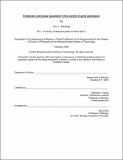Enhancers and phase separation in the control of gene expression
Author(s)
Manteiga, John C.
Download1196085936-MIT.pdf (14.86Mb)
Other Contributors
Massachusetts Institute of Technology. Department of Biology.
Advisor
Richard A. Young.
Terms of use
Metadata
Show full item recordAbstract
Gene regulation underlies the control of cell identity, development, and disease. Transcription of genes is regulated by DNA elements called enhancers, which are bound by transcription factors and coactivators, leading to the recruitment of RNA polymerase II and the production of RNA. Enhancers are thought to loop to specific gene promoters to stimulate transcription, but the mechanisms that cause enhancers to selectively loop to specific gene promoters is not well understood. In this thesis, I first describe new insights into enhancer-promoter loop specificity from studies examining the mechanisms that allow tumor-specific super-enhancers to loop to the MYC oncogene in diverse cancer types (Schuijers and Manteiga et al., 2018). While conducting these studies, it was proposed that super-enhancers and the factors associated with them form liquid-liquid phase-separated condensates. Following this proposal, I contributed to collaborative studies that strongly supported this model (Boija et al., 2018; Sabari et al., 2018, see Appendix I and II of this thesis). This model of transcription led me to ask how key transcriptional components could be recruited into super-enhancer condensates. I performed studies showing that the interaction of RNA polymerase II with these condensates involves the large heptapeptide repeat of the C-terminal domain (CTD) of the enzyme. Furthermore, these studies provided evidence that phosphorylation of the CTD, which is associated with the initiation to elongation transition, weakens these interactions, thus facilitating the transition of RNA polymerase II into different condensates involved in co-transcriptional splicing of the nascent transcript (Guo and Manteiga et al., 2019). These studies provide new insights into the mechanisms of enhancer-promoter interaction, roles for the RNA polymerase II CTD in the enzyme's partitioning into nuclear condensates, and a role for phosphorylation in switching the nuclear condensate partitioning behavior of RNA polymerase II.
Description
This electronic version was submitted by the student author. The certified thesis is available in the Institute Archives and Special Collections. Thesis: Ph. D., Massachusetts Institute of Technology, Department of Biology, 2020 Cataloged from student-submitted PDF of thesis. Includes bibliographical references.
Date issued
2020Department
Massachusetts Institute of Technology. Department of BiologyPublisher
Massachusetts Institute of Technology
Keywords
Biology.